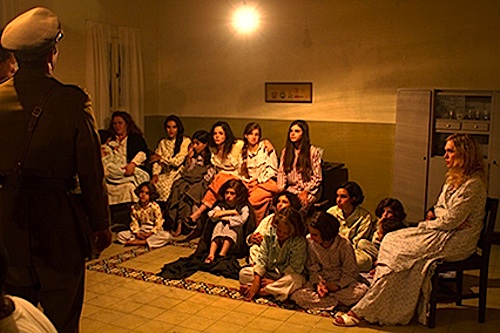By Joe Bendel. It is late 1944, several years before the declaration of the State of Israel – which means that the generous Israeli social welfare system has also yet to be established. A remote desert orphanage is the only refuge for a group of cast-off girls and their damaged caretakers. However, secrets from the director’s past raise doubts for the institution’s future in Dina Zvi Riklis’s The Fifth Heaven, which screens during the 2013 New York Jewish Film Festival, co-presented by the Jewish Museum and the Film Society of Lincoln Center.
Maya’s father never was much, but he sinks even lower when he delivers her to Dr. Markovski’s orphanage. The director, who apparently has some ambiguous history with the family, understandably protests – since Maya is not, strictly speaking, an orphan. Yet the father has evidently fixed matters with Markovski’s tight-fisted patron. We quickly deduce Markovski once had an affair with Maya’s mother, who has long since deserted her family, running off to America. Maya is a bit slower on the up-take.
Markovski’s history with Maya causes friction with his demur colleague and potential lover, Frida. The orphanage’s new cleaning woman, Berta, the disowned daughter of an Orthodox family scandalously carrying on with a British officer, further destabilizes the staff. Yet it is the cache of arms stashed on the roof by Duce, a staff-member’s Italian lover deeply involved in the underground liberation movement, that represents greater danger for the institution. Maya discovers his secret, but she has fallen for his inappropriate charm offensive.

Fifth nicely captures the strange duality experienced by Jewish residents of the British Mandate. On the one hand, they bitterly resented their colonialist rulers – while also raptly following the British war efforts against the National Socialists. Like many films set in isolated private schools, there is a whole lot of repressed sexual tension in the orphanage (almost entirely of the straight variety, though). Yet the big revelations are almost entirely given away in the opening scenes.
There are small flashes of devastating power in Fifth. In contrast, the big confrontation scenes are almost entirely drained of passion. Never melodramatic, Riklis’s restraint is something of a double-edged sword. Nonetheless, Yehezkel Lazarov’s understated but deeply humanistic portrayal of Markovski perfectly suits her approach. Rotem Zisman-Cohen also stands out as Berta, getting the film’s one big episode of acting-out. Oddly, the lead is rather icily stand-offish, while the rest of the young ensemble is largely indistinguishable.
A finely crafted period production, Fifth is sensitively underscored by the original themes and classical piano interpretations of Josef Bardanashvili. It might be a mixed bag, but it has its moments. Recommended for patrons of Israeli cinema, Fifth Heaven screens this Thursday (1/17) and Sunday (1/20) as part of this year’s NYJFF, now underway at the Walter Reade Theater.
LFM GRADE: B-
Posted on January 14th, 2012 at 12:35pm.